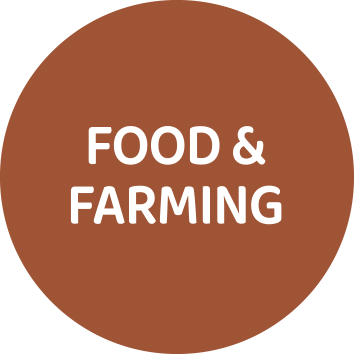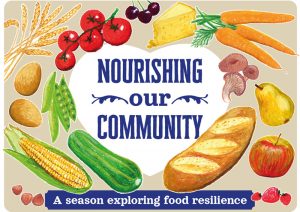Lewes Community Fridge needs volunteers.. can you help? Lewes Community Fridge has now been established for...
Read More
Food Season: Nourishing our Community
Food Season: Nourishing our Community Saturday 4 – Saturday 25 October, Lewes Climate Hub, 32 High...
Read MoreThank You from Lewes Community Fridge
‘Thank You’ from Lewes Community Fridge Lewes Community Fridge, which is open at Lewes Town Hall...
Read MoreFood, farming and the Lewes district
The UK has a huge trade gap, with just under 50% of food consumed sourced in the UK and 30% coming from EU countries, and the rest from other parts of the globe. Our food system relies on massive quantities of imports dependent on pollution-generating transport and vast distribution hubs. Of the food we do produce, land use is skewed towards red meat and dairy, including a third of cereal crops produced in order to feed livestock.
According to Lewes District Council’s “Climate Change and Sustainability Strategy 2021”, emissions from agriculture are about 8% of the District’s total emissions. 75% of these emissions are from livestock and the remaining 25% from fertilizer application. In addition to these, there are also greenhouse gas emissions from within the food system – including processing, transport and food waste.
Nationally, we are only 23% self-sufficient in fruit and vegetables. Since the 5-a-day campaign was launched by the government in 2003, there has been no change to land use to support this policy. In the South East as in most of the UK, benign weather, rich soils, land, capital and skills would support a more sustainable food production strategy including increased fruit and vegetable production.
Our food system is highly complex, and a discussion on emissions and climate change must co-exist with multiple other key issues. These include food resilience and security, human health and sustainable diets, pay and conditions for food and farm workers, care for soil and other land resources, and protection of food and ecological diversity. Internationally they include contributing to global targets and not dumping our problems elsewhere or exploiting others.
There are some seemingly intractable issues that are as starkly visible locally as they are nationally. Local food that meets health and sustainability criteria is costly if compared to highly processed foods, which are high in fats, sugar and salt, partly because it includes the cost of caring for the environment and fairer wages for farm workers. People on low income cannot afford to spend money on sustainable diets and inequality, and widening food poverty is linked to enforced poor dietary choice and diet-related ill health. The irony is that cheap, highly-processed food does not include the extremely costly damage to health and the environment. National policies are required to untangle this deadlock.
The national transport infrastructure is another obstacle to change. The plan to improve a 9-mile stretch of the A27 between Lewes and Polegate is estimated to cost £75 million; meanwhile East Sussex is very poorly served with cycle routes within and between towns and villages. This money could be better spent to help meet health and climate targets if used to enable people to walk or cycle to buy food.
A cross-cutting approach is required to transition to sustainable food and agriculture at national, regional and local levels, requiring, in some cases, huge long-term policy orientations to reshape the food system. The list of tasks below is far from comprehensive and only touches on some of the actions required.
- Audit what is being grown and what could be grown to meet sustainable diets
- Apply ecological, climate change and public health criteria to reshape agricultural land use.
- Increase acreage for fruit, vegetable and nut production, grow more diverse grains for human consumption, less grains for animal fodder
- Define sustainable diets: low carbon, caring for soil, healthy, tasty, affordable, etc
- Reskill farmers to grow more fruit and vegetables
- Release land for young growers
- Legislate for better pay and conditions for farm and food workers
- Recalculate the national minimum wage or living wage to include the cost of a sustainable diet
- Require public and private food contracts to apply sustainable dietary criteria
- Reskill cooks and caterers, including new NVQ standards that focus on sustainability and climate goals
- No new fast-food outlets
Groups and contacts
Here are details of some of the initiatives in Lewes actively promoting food and farming causes that will help to mitigate the effects of climate change. They are the product of individuals in this area taking small-scale action on issues which directly affect our environment and which encourage local engagement.
Sussex Community Development Organisation
Food Partnerships initiative in Lewes District and other districts in East Sussex
Brighton and Hove Food Partnership
- Lewes Farmers’ Market
- Lewes Community Allotment
- Ringmer Community Orchard
- Lewes House Garden Project
- Friday Food Market
The Food banks in Lewes have been dealing with food insecurity, the result of low wages, inequality and general access, for years. They can help give voice to parts of the population that might not otherwise have one.
Lewes District and Eastbourne Borough Councils are supporting local producers and businesses:

What can I do to help?
- Choose a sustainable diet
- Buy food grown or produced locally
- Buy sustainably produced food such as organic food
- Use your car less, walk or bicycle to buy food if possible
- Use public transport more
- Grow your own food organically/without pesticides or chemical fertilizers, and using potting compost without peat
- Join community growing projects and share production
- Get an allotment – email Emma Tingley at Lewes Town Council
We are growing, please excuse any omissions! Send any suggestions here, or email via the contact page.
Resources
Lewes District Council’s Climate Change and Sustainability Strategy 2021
Eating for 2 degrees – Livewell Plates looks at what we need to eat between now and 2030 to meet our Paris Agreement commitments.
Sustain and Sustainable foodplaces
these have lots of resources, tool kits and inspiring examples of best practice covering food partnerships, food governance and strategy, local policy and action plans.
Soil Association campaign for organic farming and healthy food
Soil Association Food for Life working with schools, nurseries, hospitals and care homes, helping them build knowledge and skills to make sustainable meals the easy choice for everyone.
TJ 2021



